Abstract
Euglena gracilis cells synthesize the key tetrapyrrole precursor, δ-aminolevulinic acid (ALA), by two routes: plastid ALA is formed from glutamate via the transfer RNA-dependent five-carbon route, and ALA that serves as the precursor to mitochondrial hemes is formed by ALA synthase-catalyzed condensation of succinyl-coenzyme A and glycine. The biosynthetic source of succinyl-coenzyme A in Euglena is of interest because this species has been reported not to contain α-ketoglutarate dehydrogenase and not to use succinyl-coenzyme A as a tricarboxylic acid cycle intermediate. Instead, α-ketoglutarate is decarboxylated to form succinic semialdehyde, which is subsequently oxidized to form succinate. Desalted extract of Euglena cells catalyzed ALA formation in a reaction that required coenzyme A and GTP but did not require exogenous succinyl-coenzyme A synthetase. GTP could be replaced with ATP. Cell extract also catalyzed glycine-and α-ketoglutarate-dependent ALA formation in a reaction that required coenzyme A and GTP, was stimulated by NADP+, and was inhibited by NAD+. Succinyl-coenzyme A synthetase activity was detected in extracts of dark- and light-grown wild-type and nongreening mutant cells. In vitro succinyl-coenzyme A synthetase activity was at least 10-fold greater than ALA synthase activity. These results indicate that succinyl-coenzyme A synthetase is present in Euglena cells. Even though the enzyme may play no role in the transformation of α-ketoglutarate to succinate in the atypical tricarboxylic acid cycle, it catalyzes succinyl-coenzyme A formation from succinate for use in the biosynthesis of ALA and possibly other products.
Full text
PDF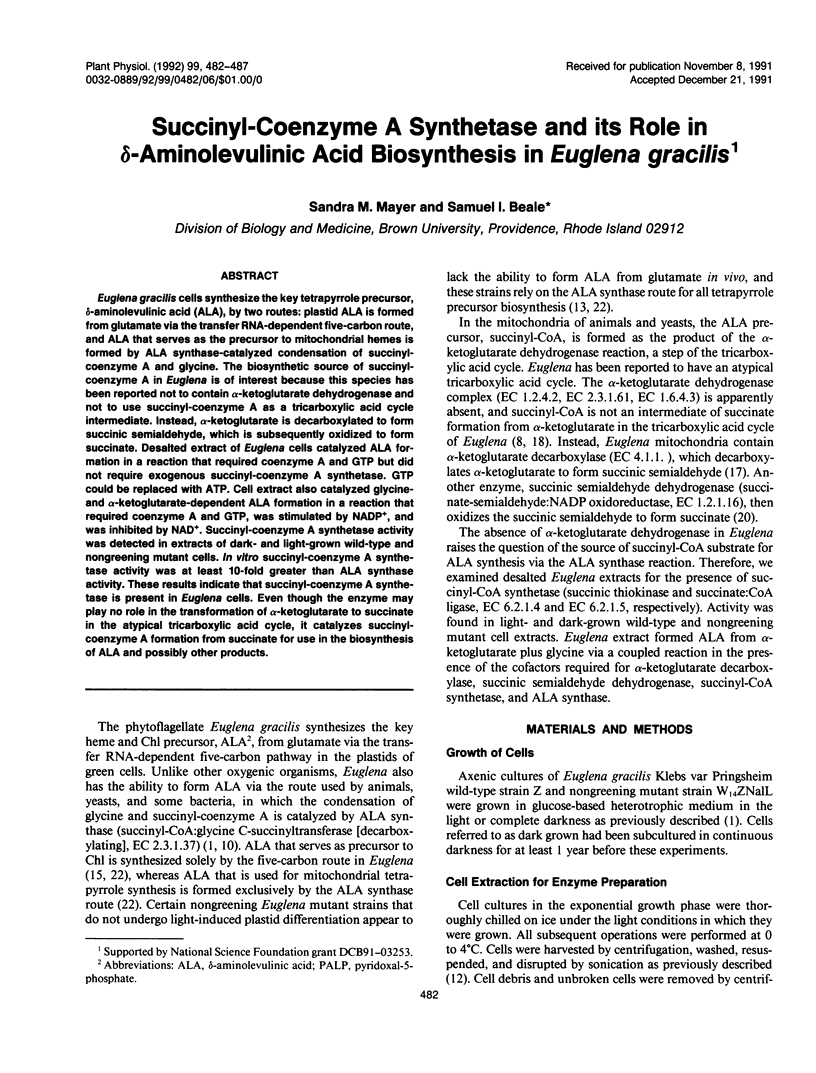
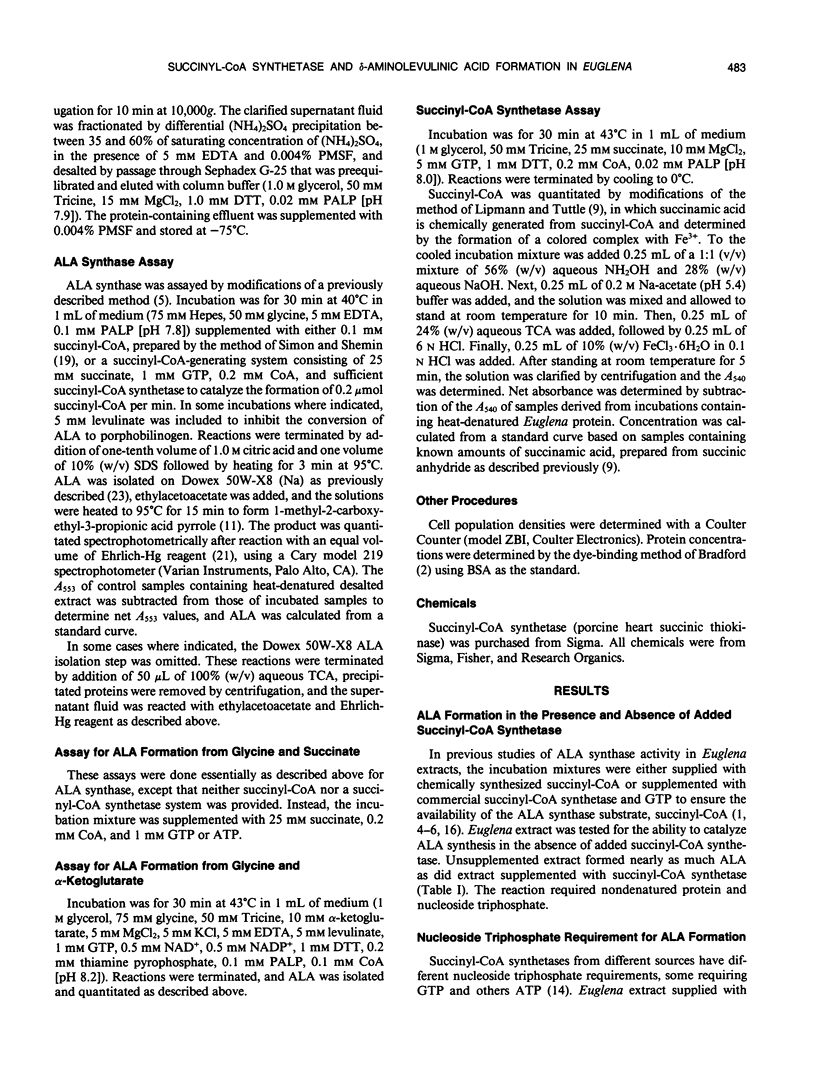
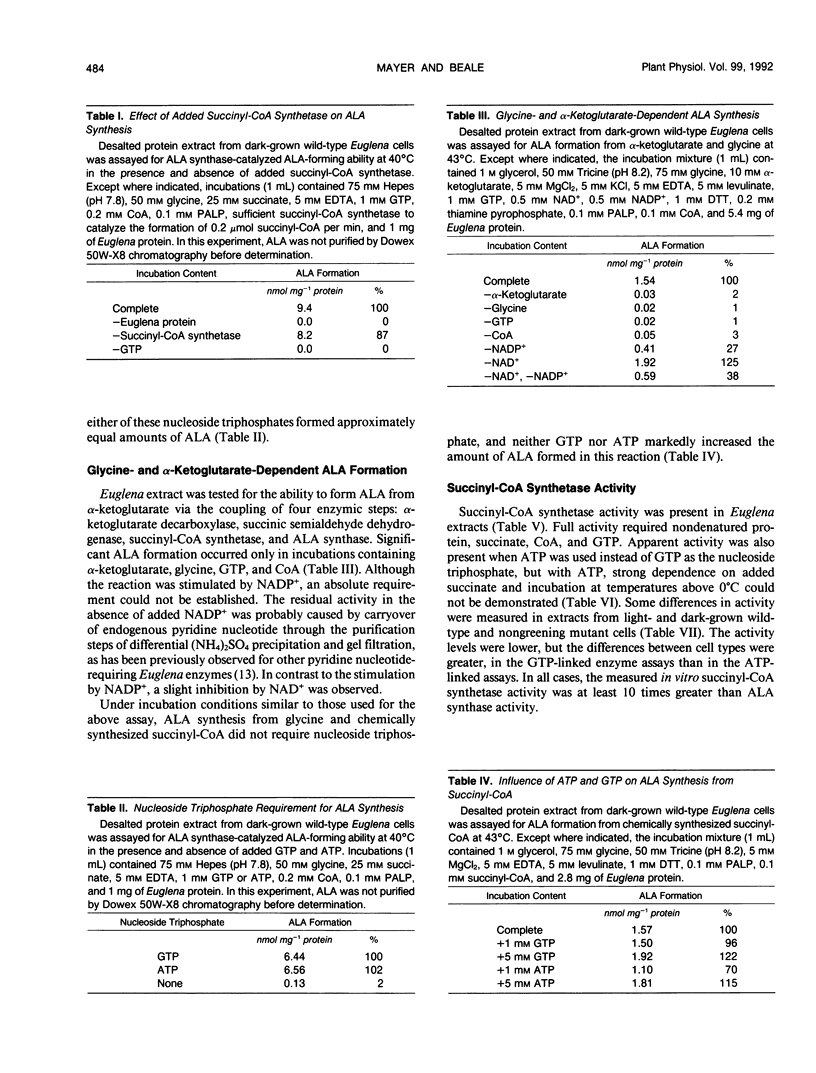
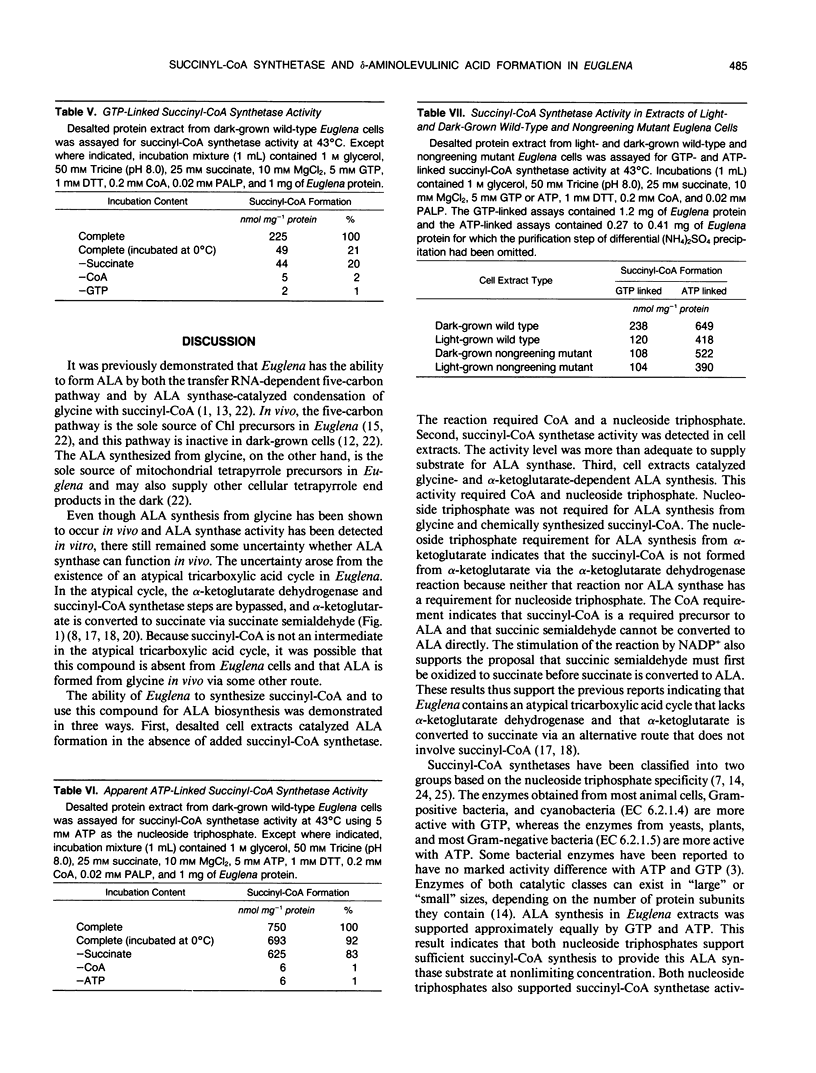
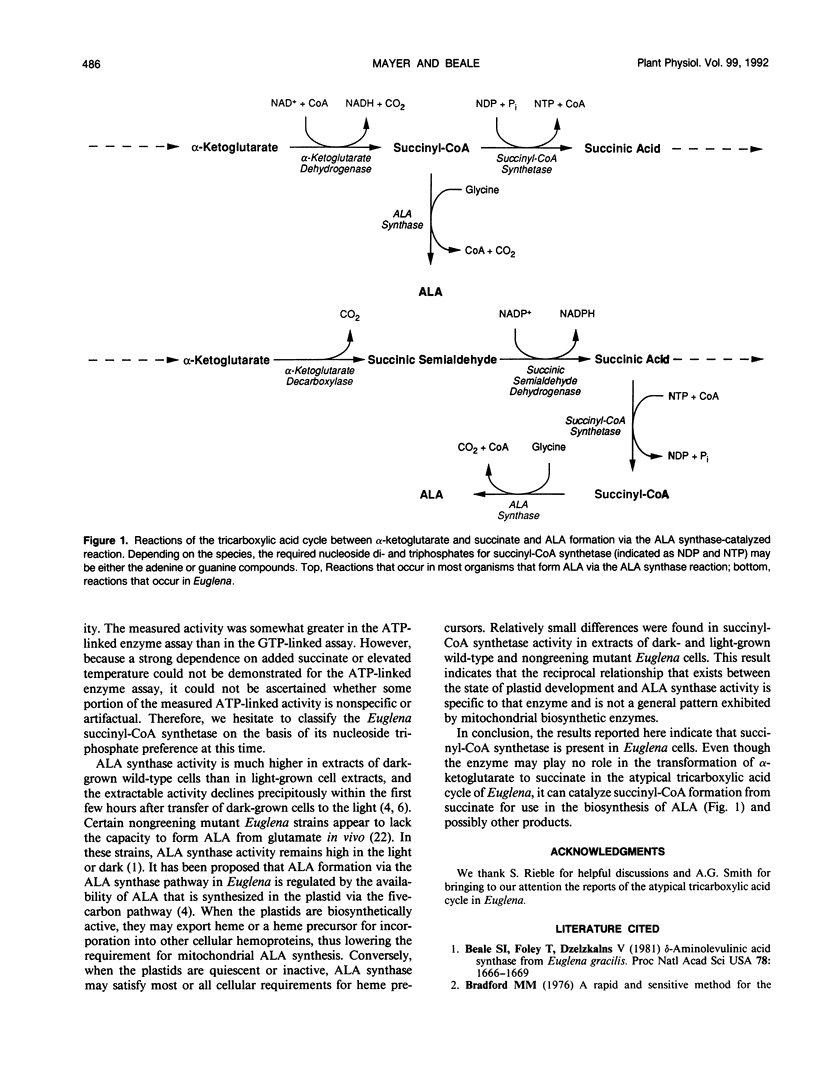
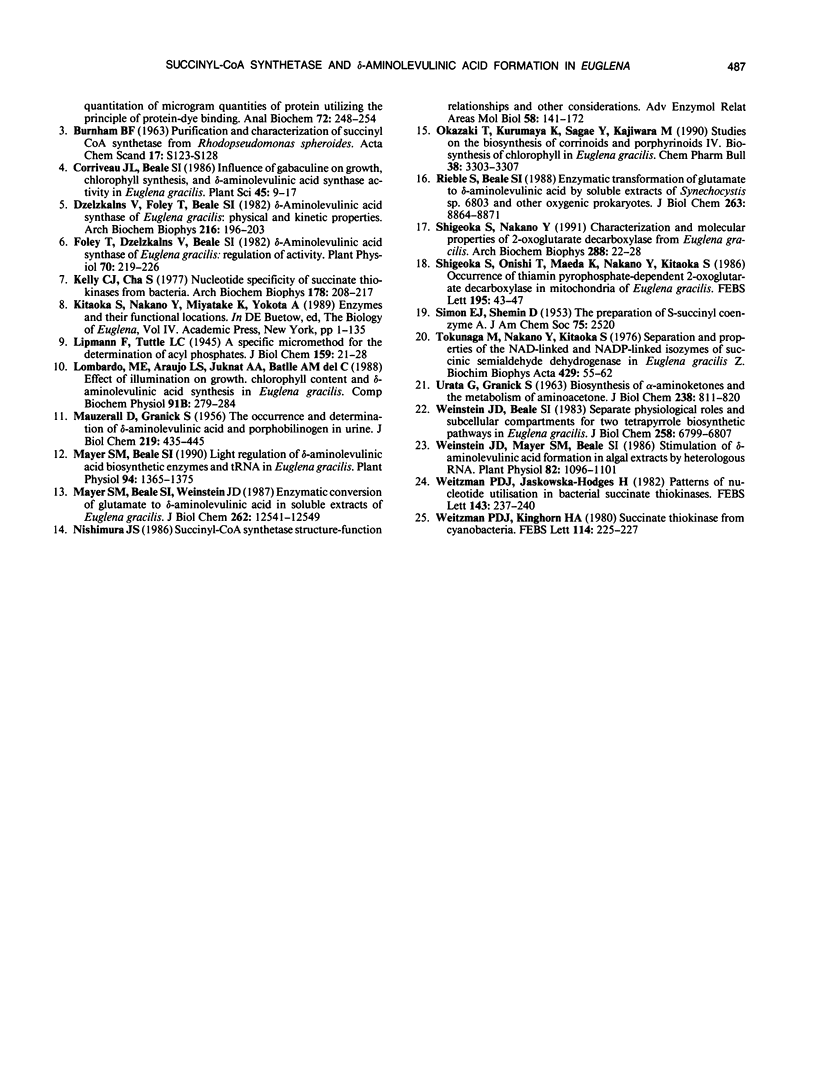
Selected References
These references are in PubMed. This may not be the complete list of references from this article.
- Beale S. I., Foley T., Dzelzkalns V. delta-Aminolevulinic acid synthase from Euglena gracilis. Proc Natl Acad Sci U S A. 1981 Mar;78(3):1666–1669. doi: 10.1073/pnas.78.3.1666. [DOI] [PMC free article] [PubMed] [Google Scholar]
- Bradford M. M. A rapid and sensitive method for the quantitation of microgram quantities of protein utilizing the principle of protein-dye binding. Anal Biochem. 1976 May 7;72:248–254. doi: 10.1016/0003-2697(76)90527-3. [DOI] [PubMed] [Google Scholar]
- Dzelzkalns V., Foley T., Beale S. I. Delta-Aminolevulinic acid synthase of Euglena gracilis: physical and kinetic properties. Arch Biochem Biophys. 1982 Jun;216(1):196–203. doi: 10.1016/0003-9861(82)90204-1. [DOI] [PubMed] [Google Scholar]
- Foley T., Dzelzkalns V., Beale S. I. delta-Aminolevulinic Acid Synthase of Euglena gracilis: Regulation of Activity. Plant Physiol. 1982 Jul;70(1):219–226. doi: 10.1104/pp.70.1.219. [DOI] [PMC free article] [PubMed] [Google Scholar]
- Kelly C. J., Cha S. Nucleotide specificity of succinate thiokinases from bacteria. Arch Biochem Biophys. 1977 Jan 15;178(1):208–217. doi: 10.1016/0003-9861(77)90186-2. [DOI] [PubMed] [Google Scholar]
- MAUZERALL D., GRANICK S. The occurrence and determination of delta-amino-levulinic acid and porphobilinogen in urine. J Biol Chem. 1956 Mar;219(1):435–446. [PubMed] [Google Scholar]
- Mayer S. M., Beale S. I. Light Regulation of delta-Aminolevulinic Acid Biosynthetic Enzymes and tRNA in Euglena gracilis. Plant Physiol. 1990 Nov;94(3):1365–1375. doi: 10.1104/pp.94.3.1365. [DOI] [PMC free article] [PubMed] [Google Scholar]
- Mayer S. M., Beale S. I., Weinstein J. D. Enzymatic conversion of glutamate to delta-aminolevulinic acid in soluble extracts of Euglena gracilis. J Biol Chem. 1987 Sep 15;262(26):12541–12549. [PubMed] [Google Scholar]
- Nishimura J. S. Succinyl-CoA synthetase structure-function relationships and other considerations. Adv Enzymol Relat Areas Mol Biol. 1986;58:141–172. doi: 10.1002/9780470123041.ch4. [DOI] [PubMed] [Google Scholar]
- Rieble S., Beale S. I. Transformation of glutamate to delta-aminolevulinic acid by soluble extracts of Synechocystis sp. PCC 6803 and other oxygenic prokaryotes. J Biol Chem. 1988 Jun 25;263(18):8864–8871. [PubMed] [Google Scholar]
- Shigeoka S., Nakano Y. Characterization and molecular properties of 2-oxoglutarate decarboxylase from Euglena gracilis. Arch Biochem Biophys. 1991 Jul;288(1):22–28. doi: 10.1016/0003-9861(91)90160-k. [DOI] [PubMed] [Google Scholar]
- Tokunaga M., Nakano Y., Kitaoka S. Separation and properties of the NAD-linked and NADP-linked isozymes of succinic semialdehyde dehydrogenase in Euglena gracilis z. Biochim Biophys Acta. 1976 Mar 11;429(1):55–62. doi: 10.1016/0005-2744(76)90029-2. [DOI] [PubMed] [Google Scholar]
- URATA G., GRANICK S. Biosynthesis of alpha-aminoketones and the metabolism of aminoacetone. J Biol Chem. 1963 Feb;238:811–820. [PubMed] [Google Scholar]
- Weinstein J. D., Beale S. I. Separate physiological roles and subcellular compartments for two tetrapyrrole biosynthetic pathways in Euglena gracilis. J Biol Chem. 1983 Jun 10;258(11):6799–6807. [PubMed] [Google Scholar]
- Weinstein J. D., Mayer S. M., Beale S. I. Stimulation of delta-Aminolevulinic Acid Formation in Algal Extracts by Heterologous RNA. Plant Physiol. 1986 Dec;82(4):1096–1101. doi: 10.1104/pp.82.4.1096. [DOI] [PMC free article] [PubMed] [Google Scholar]
- Weitzman P. D., Jaskowska-Hodges H. Patterns of nucleotide utilisation in bacterial succinate thiokinases. FEBS Lett. 1982 Jul 5;143(2):237–240. doi: 10.1016/0014-5793(82)80107-5. [DOI] [PubMed] [Google Scholar]
- Weitzman P. D., Kinghorn H. A. Succinate thiokinase from Cyanobacteria. FEBS Lett. 1980 Jun 2;114(2):225–227. doi: 10.1016/0014-5793(80)81119-7. [DOI] [PubMed] [Google Scholar]


